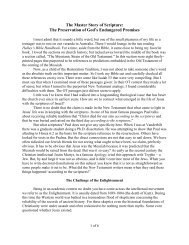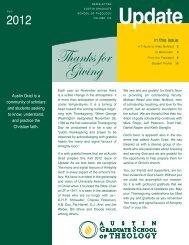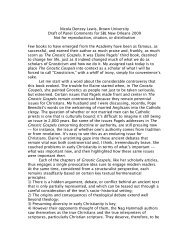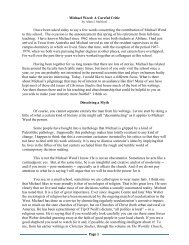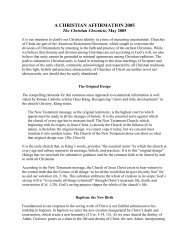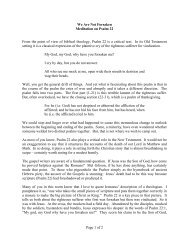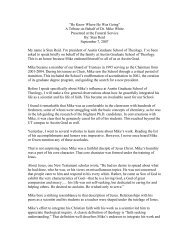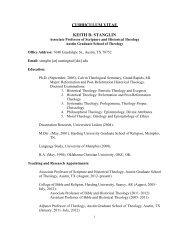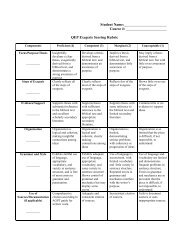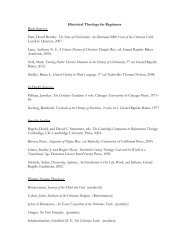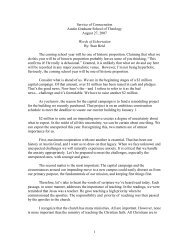You also want an ePaper? Increase the reach of your titles
YUMPU automatically turns print PDFs into web optimized ePapers that Google loves.
turns her house upside down in order to find something that was lost. This is a simple description<br />
that would almost go unnoticed by many men. But most women would do about anything in <strong>the</strong><br />
world ra<strong>the</strong>r than mess up <strong>the</strong>ir house! That may be just <strong>the</strong> point! <strong>The</strong> woman did this because<br />
<strong>the</strong> coin was so precious that she would tolerate total disorder to get it. If <strong>the</strong> woman would do<br />
this for a coin, I think that when <strong>the</strong> lost is found <strong>the</strong>re is all <strong>the</strong> more joy. Likewise with <strong>the</strong><br />
<strong>Parable</strong> <strong>of</strong> <strong>the</strong> <strong>Tares</strong>. In reading this parable I notice again something unusual. <strong>The</strong> householder<br />
does not allow <strong>the</strong> workers to remove <strong>the</strong> tares or weeds from <strong>the</strong> good plants. Good <strong>and</strong> bad will<br />
just have to exist toge<strong>the</strong>r until <strong>the</strong> end.<br />
This strikes me as odd – especially for someone who grew up in <strong>the</strong> wheat country <strong>of</strong><br />
Australia. I realize that in a large field <strong>of</strong> wheat it is impossible to go out <strong>and</strong> remove plants<br />
wholesale without tearing up some <strong>of</strong> <strong>the</strong> good ones. But I think we have overdone <strong>the</strong>se<br />
difficulties. In ancient Palestine <strong>the</strong> fields were small <strong>and</strong> <strong>the</strong>re seemed to be a lot <strong>of</strong> workers<br />
around to clean up <strong>the</strong> field. <strong>The</strong>y could have done <strong>the</strong> job on that field! As a teenager on my<br />
fa<strong>the</strong>r’s dry l<strong>and</strong> property I was <strong>of</strong>ten sent out to chip out weeds <strong>and</strong> thus save moisture for <strong>the</strong><br />
good plants. As I read this parable I can hardly hear my fa<strong>the</strong>r saying, “Don’t bo<strong>the</strong>r with that.<br />
Let everything go until <strong>the</strong> harvest.” As I said, this is odd. It is not <strong>the</strong> usual thing to do. I think<br />
<strong>the</strong> servants found this unusual as well, <strong>and</strong> probably <strong>the</strong> ancient readers would agree.<br />
But in thinking <strong>and</strong> searching for insight about this I was reminded <strong>of</strong> Jesus’ words<br />
earlier in this chapter to <strong>the</strong> disciples: to paraphrase, “pay attention in order to see, hear <strong>and</strong><br />
underst<strong>and</strong>.” And if we are paying attention <strong>the</strong>n we begin to see, perhaps to our surprise, an<br />
important word <strong>of</strong> grace emerging. To our surprise – Yes! Because <strong>the</strong>re is a lot about <strong>the</strong><br />
judgment in this parable.<br />
But grace? Here? Yes, because what is really being discussed, if we are hearing, is not so<br />
much a lesson on <strong>the</strong> sifting out process at <strong>the</strong> end <strong>of</strong> <strong>the</strong> age (<strong>the</strong> weeds will be burned); but a<br />
word on what is going on in <strong>the</strong> kingdom right now. And this is where this business about letting<br />
<strong>the</strong> weeds grow toge<strong>the</strong>r with <strong>the</strong> good wheat comes into focus. Because right here we hit a cord<br />
that has tremendous resonance in Mat<strong>the</strong>w. <strong>The</strong>re is work to be done now. Things must be done<br />
to maintain <strong>the</strong> integrity <strong>and</strong> keep within <strong>the</strong> fold <strong>the</strong> good plants: those who live in <strong>the</strong> zone <strong>of</strong><br />
<strong>the</strong> kingdom until <strong>the</strong> very end: even to <strong>the</strong> extent <strong>of</strong> not pulling up <strong>the</strong> weeds because that might<br />
hurt <strong>the</strong> good plants.<br />
We are being told with respect to those in <strong>the</strong> zone <strong>of</strong> <strong>the</strong> kingdom that <strong>the</strong> wheat is<br />
precious. Never give up on it. Allegorically speaking, some <strong>of</strong> <strong>the</strong>se marginal plants <strong>of</strong> wheat<br />
will eventually constitute part <strong>of</strong> <strong>the</strong> good harvest. This is all played out in <strong>the</strong> community<br />
discourse in Chapter 18. Mat<strong>the</strong>w is perpetually talking about <strong>the</strong> need for believers not to place<br />
“a rock <strong>of</strong> <strong>of</strong>fence” before <strong>the</strong>se “little ones” who are <strong>the</strong> disciples. In <strong>the</strong> community discourse<br />
<strong>of</strong> Mat<strong>the</strong>w 18 Jesus tells <strong>the</strong> parable <strong>of</strong> <strong>the</strong> lost sheep (Matt 18:12-14). And, in Mat<strong>the</strong>w, what<br />
does <strong>the</strong> shepherd do? He leaves behind <strong>the</strong> 99 on <strong>the</strong> mountains <strong>and</strong> seeks <strong>the</strong> one who has gone<br />
out <strong>of</strong> Mat<strong>the</strong>w’s church: <strong>the</strong> zone <strong>of</strong> <strong>the</strong> kingdom. He does this because <strong>the</strong>re is only one place<br />
where he can remain in <strong>the</strong> guidance <strong>of</strong> <strong>the</strong> Teacher <strong>and</strong> learn what it means to do God’s will.<br />
Thus <strong>the</strong> shepherd does everything to bring <strong>the</strong> straying sheep home in <strong>the</strong> Kingdom. In o<strong>the</strong>r<br />
words, <strong>the</strong> emphasis <strong>of</strong> <strong>the</strong> parable, I believe, is on <strong>the</strong> instruction to <strong>the</strong> workers, “Don’t tear up<br />
6



